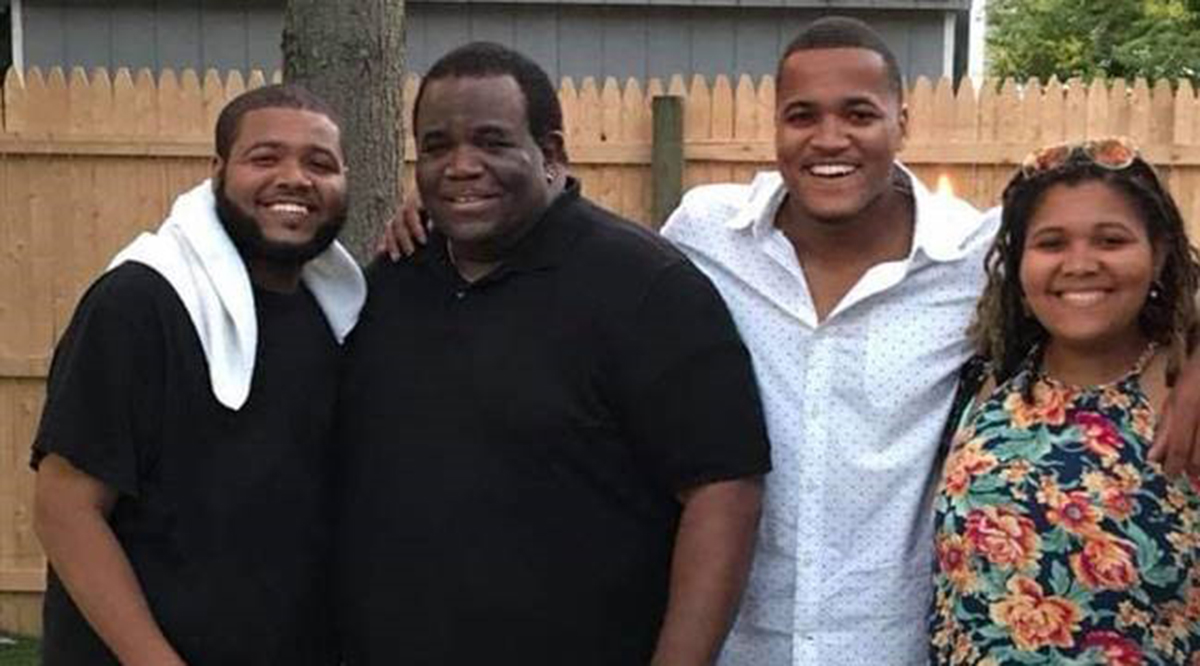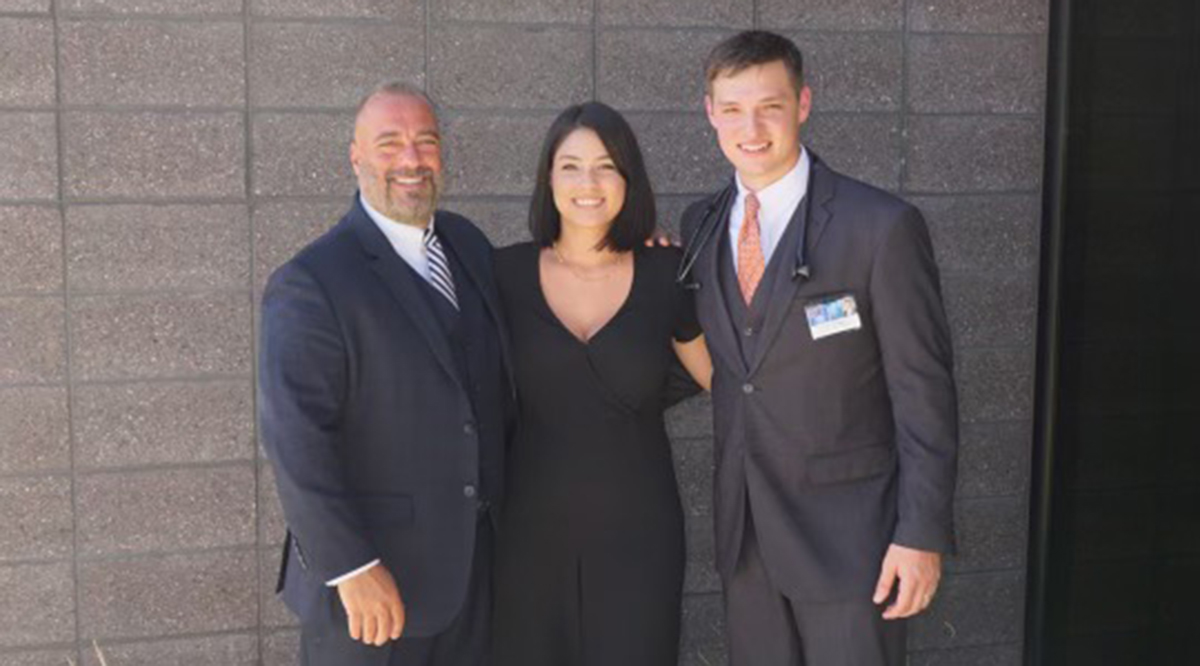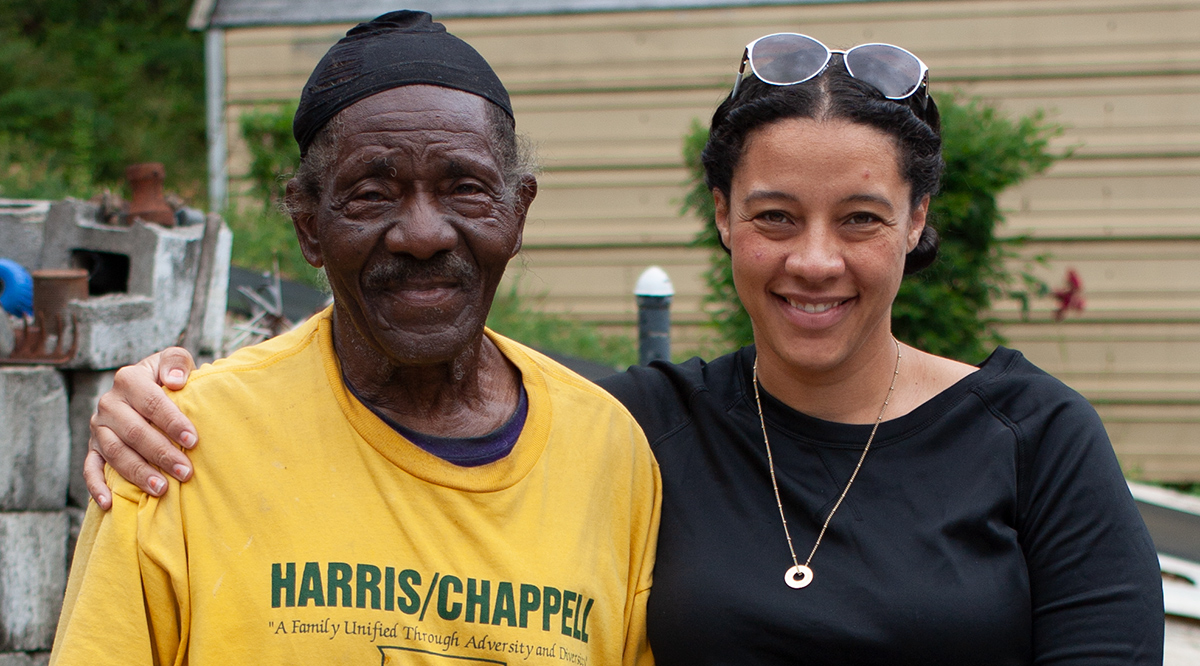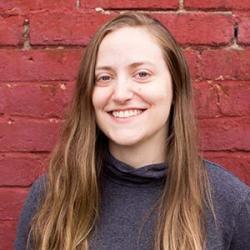
Ryan Mahoney’s last conversation with his father happened over FaceTime.
James “Charlie” Mahoney, MD, speaking from his hospital bed, asked his youngest son about the NFL draft and teased him about their rival teams: the New York Jets and Giants.
“It was such a me-and-him conversation,” Ryan recalls.
At the time, Ryan, then a second-year medical student at Rutgers New Jersey Medical School in Newark, was supposed to be studying for the United States Medical Licensing Examination Step 1 — which kept getting postponed because of the COVID-19 pandemic — but he couldn’t focus.
Dr. Mahoney, a physician in pulmonary and critical care at University Hospital of Brooklyn with more than three decades of experience, had spent the past several weeks on the front lines of the first, desperate wave of the pandemic in New York. He’d sent Ryan photos of himself decked out in personal protective equipment as he treated some of the first COVID-19 patients in the city.
And suddenly, he was one of those patients.
Ryan wasn’t allowed to visit him as the hospital enforced strict visitor restrictions to limit spread of the virus, so their communication was limited to FaceTime. Dr. Mahoney gave little indication of the severity of his illness, although he must have known it was dire after he insisted on seeing his own chest X-ray.
Shortly after his last conversation with Ryan, Dr. Mahoney was intubated. He died a few days later on April 27, 2020.
Over the past year, Ryan has found some comfort in immersing himself in his studies and clinical work. He had chosen to follow in his father’s footsteps by attending medical school — and the outpouring of support from his father’s patients motivated Ryan to keep working hard.
Still, constantly being surrounded by COVID-19 wears on him.
“Every time I see things about the pandemic, I obviously think about my father and I think about what’s happened to me,” Ryan says. “It’s been in my face all year. When you turn on the news, when you go to the hospital … it’s all they talk about. … It is tough to see that stuff and constantly think about it.”
A year after the death of Dr. Mahoney, COVID-19 has taken the lives of more than 560,000 people in the United States, leaving behind countless loved ones to mourn their loss — including some medical students, residents, and medical school faculty who have had to endure their personal grief on top of the heightened stress of medical training during a pandemic.
“There are always trainees and students who lose a loved one during medical training. That’s difficult any time in life, but especially when you’re very busy in medical school,” says Amit Shah, MD, associate dean for student affairs at the Phoenix campus of Mayo Clinic Alix School of Medicine (SOM). “COVID has dramatically increased the pace of these losses. … I can’t think of an institution that has been unscathed.”
Being the doctor in the family

Daniel Rodriguez, a third-year medical student at Mayo Clinic Alix SOM, is the only person in his family who works in the medical field.
So, when his father was hospitalized with COVID-19 in December 2020, Rodriguez’s family looked to him to make medical decisions.
This meant that Rodriguez was taking daily calls from his father’s doctors in New York, often having to step away from his clinical work during the 60-plus hour workweeks of his surgery clerkship. He was also tasked with relaying and translating medical information to the rest of his family.
Because of his medical training, he knew from early on in his father’s illness that the outcome would not be good.
“That was the toughest part: kind of knowing where his future was headed and trying to stay optimistic,” Rodriguez says. “There was a lot of pressure from my whole family, trying to explain to everybody what all this means, just trying to have answers.”
This is a challenge that Shah has seen many medical students face when they experience the illness of a loved one during their training. They must juggle being both family member and medical advisor.
“When you’re a physician, you’re used to people calling about everything,” he says. “When you’re a trainee, that’s new to you.”
Rodriguez was able to fly out to visit with his father once before he died, but because of the risk from the pandemic, he and his family have not yet held a funeral or memorial. They’re planning a small gathering in New York this June.
In the months since his father’s death, Rodriguez notes that his greatest support system has been his wife and four young children. But he’s also grateful for the work that keeps him busy and, in some ways, has helped him cope with the loss of his father.
“I think, being in the medical field, you do see a lot of people who are dying,” he says. “Having that experience with dealing with very sick people, I think it just makes you a stronger person overall.”
Leading by example

As assistant dean for student affairs at TCU and UNTHSC School of Medicine in Fort Worth, Texas, Danika Franks, MD, has had to be strong — not just for her students but also for her family.
Last September, the emergency medicine physician lost her 93-year-old grandfather, James Morris Taylor Sr., to COVID-19.
As the only doctor in her family, Franks struggled with trying to ensure her grandfather was getting the best care possible in Alabama while also continuing her work and parenting her three young children in Texas.
“It was hard to make sure the doctors knew him as a person, not just [a patient],” she explains. “As a physician, I’m intimately aware that having family or loved ones in the room to advocate on your behalf humanizes you.”
Franks would tell the nursing staff personal details about her grandfather to help them connect with him, like how he was most motivated by orange soda and that he, a Black man, had once stood guard outside of a home where Martin Luther King Jr. was staying to protect him as he worked for civil rights. She would coordinate frequent calls with her extended family to translate the scary and complex medical terminology.
After more than two months battling COVID-19, Mr. Taylor succumbed to his illness.
“It was devastating,” Franks says. “The patriarch of our family died alone, with nobody holding his hand and us trying to let him know through an iPad that we love him.”
Although Franks feels fortunate that her family was able to plan a small memorial, she hasn’t yet let the reality of the loss hit her as she has poured her energy into her students.
“I work with our medical students very closely. … I think that it has been an enormously high calling,” she notes. “It’s been so much ‘all hands on deck.’”
Recognizing physician and trainee humanity
Franks’ own experience also reminds her about the importance of changing the culture in the medical field surrounding mental health and well-being.
“You come out [of medical school] feeling like a version of a superhuman,” she says. “[But] what we have to remember — as we continue to press forward, educate our communities, advocate for our communities — we have to not lose sight of the fact that we are just as human as the patients we care for.”
Even before the pandemic, medical students experienced symptoms of depression and suicidal ideation at disproportionately high rates compared to their peers outside of medical training. The pressure, exhaustion, and burnout has intensified during the pandemic, when learners have experienced disruption to their training and often seen the toll of COVID-19 firsthand in the hospitals while also navigating the pandemic’s impact on their personal lives.
“What we’ve tried to do is to really promote a cultural change within the institution — a sensitivity to the reality that people who work in health care … we’re all human beings,” says John Kennedy Jr., MD, senior advisor and director for wellness at the University of Alabama at Birmingham (UAB) Department of Medicine. “We’re all susceptible to the same challenges that all human beings have.”
“We can anticipate that as the pandemic winds down — when it winds down — that there will be a time of processing and grieving. If there’s an individual who has had a personal loss, the next few months might be the time they take a breath and are able to process.”
Jonathan Ripp, MD, MPH, chief wellness officer, Icahn School of Medicine at Mount Sinai
Some institutions have offered resource guides and apps that help connect students and staff to different kinds of social supports, from resiliency workshops and individual counseling to financial and legal aid. Others have tried to meet students and staff where they are, offering flexible schedules and bringing mental health help to them.
For example, Mayo Clinic allows students to take a leave of absence without having to pay any additional tuition or fees if they feel they need time off for personal reasons, Shah says. And at Mount Sinai Health System in New York City during the COVID-19 surges, mental health professionals went from unit to unit where COVID-19 patients were being cared for to check in on health care workers and make sure they were aware of available resources, according to Jonathan Ripp, MD, MPH, dean for well-being and resilience and chief wellness officer at the Icahn School of Medicine at Mount Sinai.
While the pandemic in the United States may seem to be waning in some areas, Ripp says that it’s important to remember that it is not over and that the emotional toll will persist long after case counts drop.
“We can anticipate that as the pandemic winds down — when it winds down — that there will be a time of processing and grieving,” he says. “If there’s an individual who has had a personal loss, the next few months might be the time they take a breath and are able to process.”
Carrying on a legacy
When Dr. Mahoney was laid to rest, the funeral service was limited to only close family members, but it was broadcast on Zoom. Ryan later watched a recording of the call and saw that, for three hours, more than 200 people logged on and shared stories about the beloved New York doctor. Many of them were patients who said he’d saved their lives.
“It was amazing to see how many people he interacted with. He touched so many lives,” Ryan says. “He didn’t come home and say, ‘I saved 10 lives today.’”
“Students get jaded. [Seeing illness and death], it’s nothing to us. But on the other side of the bed, this is your dad, your brother, your mom — this is somebody who is a huge part of your life. Understanding what it’s like to be in that position, it’s already forced me to be more patient and empathetic and care for [my patients] better.”
Ryan Mahoney, third-year medical student, Rutgers New Jersey Medical School
In fact, he remembers a man who was not only an extraordinary physician but also an amazing dad and Little League coach.
“He was always in my life,” Ryan remembers. “He always made time for me and my brother and sister.”
And when Ryan decided to pursue a career in medicine, he says that Dr. Mahoney was able to provide support without adding pressure.
“Seeing what he did and the impact he made … he was my hero,” Ryan says. “I wanted to do what he did.”
Dr. Mahoney’s life and career inspired him to pursue medicine in the first place, and now even his death will have an impact on the type of physician Ryan becomes as he continues his father’s legacy.
“Students get jaded. [Seeing illness and death], it’s nothing to us,” he says. “But on the other side of the bed, this is your dad, your brother, your mom — this is somebody who is a huge part of your life. Understanding what it’s like to be in that position, it’s already forced me to be more patient and empathetic and care for [my patients] better.”
